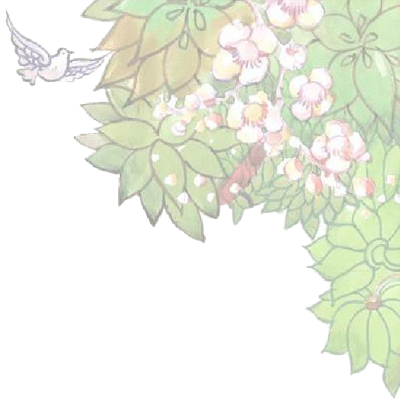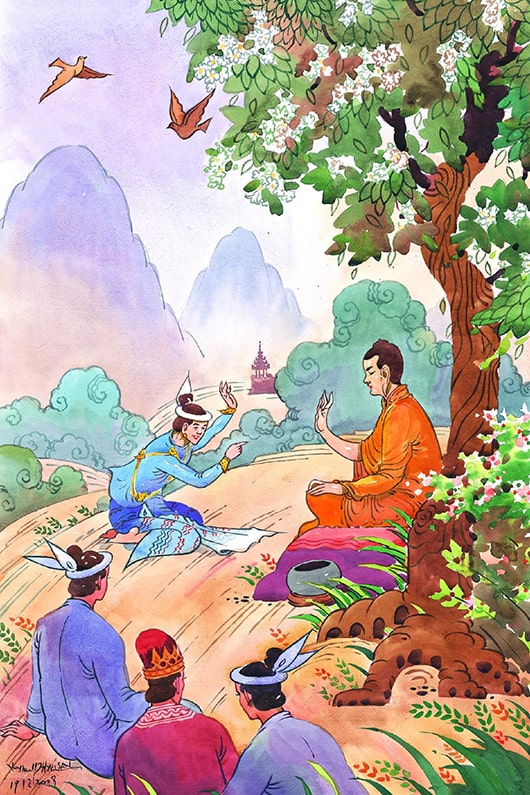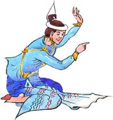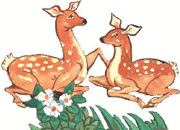16話 ビンビサーラ王の申し出を断る

第1部 出家まで
第5章 出家
16話 ビンビサーラ王の申し出を断る

僧になって最初の七日間、菩薩はアノーマー川からそれほど遠くないアヌピヤというマンゴー樹林の近くで、冥想と行者生活の至福を楽しむことですごした。八日目にそこをはなれ、マガダ王国の首都ラージャガハ(王舎城)へ向かい、南方に三十ヨージャナの旅をした。王国はビンビサーラ王が統治し、第一王妃のコーサラ・デーヴィーはマハー・コーサラ王の娘でコーサラ国パセーナディ王の妹、そしてかれらの息子はアジャータサットゥ王子だった。ビンビサーラ王の別の妃はケーマーという名で、のちに比丘尼となり、世尊によって女性の第一弟子に指名される。
托鉢に出かけた日の朝、菩薩はガティカーラ梵天がくれた衣をきちんとまとい、乞食の鉢をもって、ラージャガハへ東門から入った。信仰心の篤い家から家へお布施の食べ物を受け取って、ラージャガハの通りを歩いた。菩薩が宮殿敷地の脇を通りすぎているとき、ビンビサーラ王が、まる一週間続いた祭りのあとに人びとへ閉幕の指示を出そうとしていた。王は宮殿の高殿のテラスに立っていて、菩薩を見た。感官をよく制御して、ひっそり静かに歩いていたのである。
菩薩の托鉢に食べ物を布施した信仰心篤い家の人びとと、宮殿の敷地に集まっていた人びとの両方とも、ほかの行者とはちがう菩薩のひときわすぐれた外見にびっくりした。それを見た誰もが、まだとても若く、凜々しく、はれやかで明るい表情をして、衣をきちんと着ているのに驚いた。落ちつきのある感じのよい人相をしていて、視線は下方に向けられ、わずかに六足分(二㍍弱)の先を見ている。歩くときはいつでも、手を伸ばすときや曲げるときも、つねに上品だった。たとえようもなく優雅で気品のある菩薩の物腰をラージャガハの人びとは口々に興奮して話しはじめ、ほんのわずかの間に大騒ぎになった。
一方、優雅な行者の登場を知った王宮の従者たちは、ただちにビンビサーラ王のもとへ行って、こう報告した。
「陛下、行者の衣をまとった若い男が、托鉢して通りを歩いております。凜々しく、清らかで、きちんとして、もの静かで落ちつきがあり、感じがよく、わたしどもがよく見かける通常の行者とは異なっております。しかし誰もかれのことを何も知りません」
これをきいて、つい先ほど菩薩の姿を見たばかりの王は、もっと知りたくてしかたがなくなった。三人の王の使者に「行者を追え! 何をしているか注意深く監視して、居場所を突き止めよ! 話せる機会があれば、まずあいさつをして、丁重にきけ」と指示した。
一方、この日の托鉢で十分な食べ物を得た菩薩は、街をはなれ、東門を通って、ふだん行者たちが滞在しているパンダヴァ山(白善山)に向かった。東側の斜面に着いて、山の洞窟の入り口の木の下の木陰に座り、托鉢で得た食べ物を食べる準備をした。托鉢の碗のふたをあけて見て、非常に衝撃を受けた。ラージャガハの街の家々でもらったごはんとカレーで、それが混ざってぐちゃぐちゃなのだ。胸が悪くなる見かけで、これまでの半生でこんな食べ物を見たことがなかった。
王子としてふだん、きれいで、白い、香りのよいごはんに、たくさんのおいしく料理されたおかずや、食欲をそそる付け合わせを食べていた。見るだけ、匂いをかぐだけでも食欲が増したのに! ところがいま、この碗の中のごはんとカレーを食べなければならないのである。食欲を失い、胸が悪くなる思いだった。ごちゃごちゃの見かけと、ひどく不快な臭いに、気分が悪くなった。そして、まさにひと口食べようとして、ほとんど吐き出しそうになった。
そのとき、自分に、こういいきかせた。「シッダッタ、おまえが最高の快楽と力のある王子だったとき、僧になりたい、と思ったのではないのか? 王立公園で見た僧のように、托鉢にまわって得た食べ物を食べられる自分を想像しなかったのか? おまえは、多くの有情のために、生老病死を乗りこえる薬を探すために僧として気高く貴い道を歩もう、と決めたのではないのか? いまやおまえの願いがかなったのに、なぜ、行者の生活にがっかりして、いまだに王子にふさわしい暮らしを夢見ているのか?」
このように考えながら、食べ物を、ひたすら体を維持し、純潔な暮らしをささえる滋養物としてみるように集中することに決めた。かれは、もはや嫌悪感もなく、碗の中の食べ物を食べたのである。
王の使者たちが菩薩の居場所を突き止めたとき、その三人のうちの二人が一定の距離をおいて監視をつづける一方、残りの一人は王に知らせるために帰り、「陛下、行者は托鉢にまわって食べ物を得たあと、パンダヴァ山の東側の斜面に向かい、山の洞窟の入り口付近の木の下の木陰で、食べました。かれはそこでいま、静かに坐っております」と報告した。
それをきいてビンビサーラ王はすぐさま興奮し、おしのびで王の馬車に乗って、菩薩のいる場所へ向かった。馬車がもはや入れないところまで行くと、歩いて進みつづけた。菩薩に近づいていき、許しを得て横に座った。菩薩の外見に、王はたいへん強い印象を受けた。そして、親しくあいさつを交わし、元気かどうかきいた。王は「あなたはまだお若く、すばらしい容姿だ。完全な身体のしるしと特徴をおもちである。しかし、お若いのに行者になられた。あなたはどういう方なのか、お話ください!」といった。
菩薩は自分が何者か、明らかにした。
「陛下、わたしはカピラヴァットゥ地域から参りました。ヒマラヤ(雪山)山脈の麓で、コーサラ族の国内にあります。父はスッドーダナ王で、その地域を統治しており、太陽の種族の血脈に属しています。したがって、わたしは太陽(アーディッチャ)の種族の一員です。そしてわたしの栄光ある出生によって、わたしは釈迦(サーキャ)族に属していて、『サーキャ』とはわれらの先祖であるオッカーカ王が、“道理にかない有能な”子孫のために、と新たに名づけたのです。わたしの名はシッダッタで、姓はゴータマです」
このとき以来、菩薩は人びとに「ゴータマ行者」として知られるようになった。
ビンビサーラ王は、さらにたずねた。
「なぜ、あなたは行者になられたのですか? お父上とけんかなさったのですか?」
「いいえ、偉大な王よ、父とけんかしておりません。その反対で、わたしは両親、妻、息子、あなた、そのほかみんなを慈しんでおります。わたしが行者の生活をはじめたのは、僧になることによって涅槃(ニッバーナ)に達するためです」と、菩薩は答えた。
「尊い方よ、あなたは純粋に支配者階級の出でいらっしゃる。この世から隠遁されてはいけません! わが国の首都へ来て、滞在してください! 王の楽しみと財産を、あなたにできる限り提供しましょう。アンガとマガダの二国をわたしは支配しております。その支配権の半分をあなたにさしあげましょう。王になって、統治してください!」と、ビンビサーラ王は申し出た。
菩薩は丁重に断り、こう言った。
「たいへんありがとうございます、陛下! わたしは、あらゆる物質的な楽しみには、何の欲望もありません。そんなものは望めば実際に得ることもできましたが、望まなかったのです。しかし、すべての有情のために聖なる生活を送っている僧に出会ってからは、かれのように僧になって、気高い道をたどろうと決めたのです。そうすることによってわたしは、あらゆる有情を生老病死の苦難から救うことができるようになるでしょう」
この説明をきいて、王は答えた。
「尊い方よ、あなたは栄光と権力にみちた王座を手に入れようとしておられたのに、それをためらいもなく、まるで唾みたいに捨てられた。人間社会のために僧になられている。あなたの目的は何と崇高であることか! あなたの涅槃への大望をわたし自身が知ってしまって、あなたはブッダになられるとわたしは確信しています。尊い方よ、わたしはもはや、あなたのお時間を取らせませんが、一つお願いをさせてください。あなたが完全なさとりを実現されたらただちに、どうか、わが首都ラージャガハへ、最初に来てください」
菩薩が承諾後、王は都へ帰った。
※ 画像やテキストの無断使用はご遠慮ください。/ All rights reserved.

Episode 16 REJECTING KING Bimbisāra’S OFFER
During the first seven days after becoming a monk, the Bodhisatta spent his time in a nearby mango grove called Anupiya, not far from the Anomā River, contemplating and enjoying the bliss of ascetic life. On the eighth day, he left that place and travelled thirty yojanas southward to Rājagaha, the capital city of the Magadha Kingdom, which was ruled by King Bimbisāra—his chief queen was Kosala Devī, daughter of King Mahā Kosala and sister of King Pasenadi Kosala; their son was Prince Ajātasattu. King Bimbisāra had another wife named Khemā, who later became a bhikkhunī and was appointed as the first chief female disciple by the Blessed One.
In the morning when it was time to go for alms, the Bodhisatta donned his robes properly, took his alms-bowl—offered by Brahmā Ghaṭikāra, and entered the City of Rājagaha from the eastern gate. He walked from house to house receiving alms-food from devout families along the streets of Rājagaha. The Bodhisatta was passing by the palace ground when King Bimbisāra was about to give closing instructions to his citizens after a full-week festival. Thus, when the king was standing on the upper terrace of the palace, he saw the Bodhisatta walking calmly with his senses well-controlled.
Both the devout families who offered alms-food to the Bodhisatta and the citizens who were gathering in the palace ground were astonished by the distinguished appearance of the Bodhisatta, who was different from other ascetics. Everyone was amazed seeing the Bodhisatta, who was still very young, handsome, with clean and bright complexion, and who wore his robes neatly. His face was composed and pleasant, his eyes downcast seeing about only six feet ahead. Whenever he walked, stretched or bent his arms, he did it elegantly. Thus in a short time, the citizens of Rājagaha turned into a state of commotion talking about the incomparably graceful and unique demeanour of the Bodhisatta.
In the mean time, the royal attendants who knew about the presence of an elegant ascetic around the city immediately went to King Bimbisāra and reported: “Your Majesty, we have found a young man in ascetic dress walking around the streets collecting alms-food; he is handsome, clean, neat, calm, and pleasant, unlike the ordinary ascetics we usually meet. But no one knows anything about him.”
Hearing this, the king, who had seen the Bodhisatta a few moments ago, became enthusiastic to know more. He instructed three of his royal messengers: “Follow the ascetic! Observe carefully what he does, and find out where he stays! If you had a chance to talk, you should greet him first and inquire him politely.”
Meanwhile, after the Bodhisatta had gathered enough alms-food for the day, he left the city through the eastern gate and headed for the Paṇḍava Hill, where ascetics usually stayed. Having arrived at the eastern slope, he sat under the shade of a tree at the entrance of a mountain cave and prepared to take the alms-food. When he opened the lid of his alms-bowl, he was quite shocked with what he saw. The rice
and curries, offered by the families of the Rājagaha City, were mixed up together and looked very disgusting to him as he had never seen such foods all his life.
As a prince, he usually ate clean, white fragrant rice with many dishes cooked deliciously and garnished attractively; even seeing or smelling the dishes would increase his appetite! But now, he had to consume the rice and curries in his alms-bowl. He lost his appetite and felt disgusted. He felt sick by the jumbled appearance and the terribly unpleasant smell of the foods. And when he was about to put a
morsel into his mouth, he almost vomitted.
He then admonished himself thus: “Siddhattha, when you were a prince full of pleasure and power, didn’t you yourself want to become a monk? Didn’t you yourself imagine the time when you could eat the meals obtained by going on alms-round like the monk you saw in the garden? Weren’t you yourself determined, for the sake of the many, to find the medicine for overcoming birth, ageing, sickness and death by following the noble path of monkhood? Now that you have fulfilled your wish, why
are you discouraged of the ascetic life and still dream of things befitting a prince?” Thinking thus, he made up his mind to concentrate on the food merely as nutriments to sustain the body and to support his chaste life. He took the meals without any repulsion.
When the royal messengers knew where the Bodhisatta stayed, two of them kept staying in a distance to keep an eye on him, while the third returned to the king informing thus: “Your Majesty, after collecting his alms-food, the ascetic headed for the eastern slope of the Paṇḍava Hill and took his meal under the shade of a tree at the entrance of a mountain cave. He is now sitting calmly there.”
Thereupon, King Bimbisāra became excited and personally went in his royal chariot to where the Bodhisatta stayed; he continued his journey on foot from where the chariot could not go any longer. He approached the Bodhisatta and sat down on one side with his permission. The king was very much impressed by the appearance of the Bodhisatta, and he gladly exchanged greetings and asked about his health. The king said: “You are still young and good-looking. You are also endowed with perfection of physique and characteristics, but in your youthful age you have become an ascetic. Please tell me who you really are!”
The Bodhisatta revealed his identity: “Your Majesty, I come from the region of Kapilavatthu, located at the foothills of the Himalayas, in the land of the Kosalan people. My father King Suddhodana, who reigns over the region, is of the lineage of the Sun; thus I am of the Ādicca (the Sun) clan. And by my glorious birth, I am of the Sākya clan, “Sākya” being a new name which our ancestor King Ukkaka gave to his
skilful (sākya) off-springs. My name is Siddhattha and my family name is Gotama.” Since then, the Bodhisatta was known as “the ascetic Gotama” by the people.
King Bimbisāra asked further: “Why do you become an ascetic? Have you quarrelled with your father?”
“No, O great king, I do not quarrel with my father. On the contrary, I love my parents, wife, son, you and everybody else. I take up ascetic life by becoming a monk to achieve Nibbāna,” the Bodhisatta replied.
“Venerable sir, you come from the pure ruling class. Do not recede from the world! Come and stay in my capital city! I will offer you as much royal pleasure and wealth as possible. The two countries of Aṅga and Magadha are under my control. I will give you half of my sovereignty over the countries. Be a king and reign!” King Bimbisāra offered.
The Bodhisatta rejected politely, saying: “Thank you very much, Your Majesty! I have no desire at all for all material pleasures which I could have actually obtained had I wanted to. But after having met a monk who led a holy life for the sake of all living beings, I am determined to become a monk like him by following his noble path. By doing so, I will be able to help all sentient beings from afflictions caused by birth, old age, sickness and death.”
Having heard the explanation, the king replied: “Venerable sir, when you are about to acquire the throne which is full of glory and power, you leave it without hesitation as if it were spittle; for the sake of humanity, you become a monk. How sublime is your aim! Having known myself your great aspiration for Nibbāna, I firmly believe that you will certainly become a Buddha. Venerable sir, I shall not take your
time any longer, but let me make a request. Please come first to my capital city, Rājagaha, as soon as you have realised the Perfect Enlightenment.” After the Bodhisatta had given his approval, the king went back to the city.
※ 画像やテキストの無断使用はご遠慮ください。/ All rights reserved.
アシン・クサラダンマ長老
1966年11月21日、インドネシア中部のジャワ州テマングン生まれ。中国系インドネシア人。テマングンは近くに3000メートル級の山々が聳え、山々に囲まれた小さな町。世界遺産のボロブドゥール寺院やディエン高原など観光地にも2,3時間で行ける比較的涼しい土地という。インドネシア・バンドゥンのパラヤンガン大学経済学部(経営学専攻)卒業後、首都ジャカルタのプラセトエイヤ・モレヤ経済ビジネス・スクールで財政学を修め、修士号を取得して卒業後、2年弱、民間企業勤務。1998年インドネシア・テーラワーダ(上座)仏教サンガで沙弥出家し、見習い僧に。詳しく見る
奥田 昭則
1949年徳島県生まれ。日本テーラワーダ仏教協会会員。東京大学仏文科卒。毎日新聞記者として奈良、広島、神戸の各支局、大阪本社の社会部、学芸部、神戸支局編集委員などを経て大阪本社編集局編集委員。1982年の1年間米国の地方紙で研修遊学。2017年ミャンマーに渡り、比丘出家。詳しく見る

※ 画像やテキストの無断使用はご遠慮ください。
All rights reserved.

